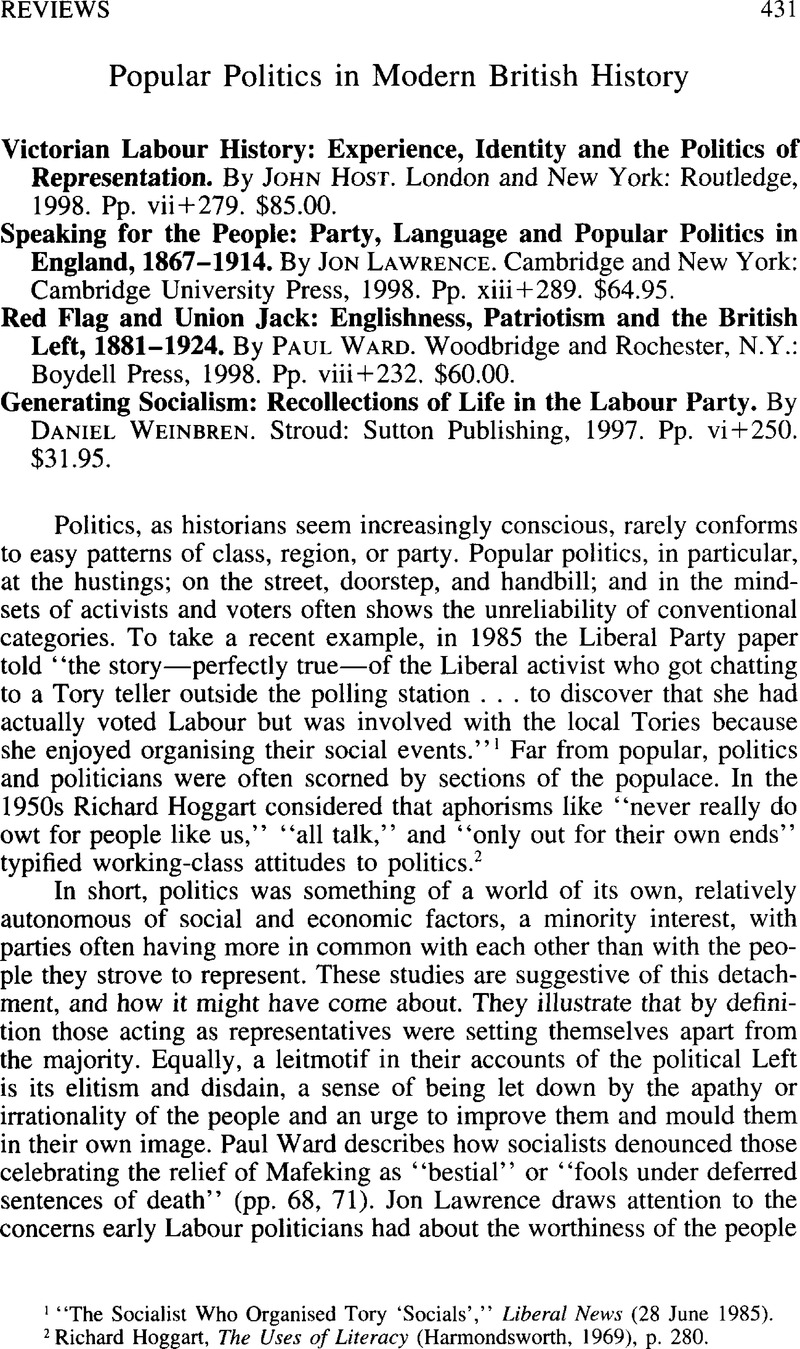Article contents
Popular Politics in Modern British History - Victorian Labour History: Experience, Identity and the Politics of Representation. By John Host. London and New York: Routledge, 1998. Pp. vii + 279. $85.00. - Speaking for the People: Party, Language and Popular Politics in England, 1867–1914. By Jon Lawrence. Cambridge and New York: Cambridge University Press, 1998. Pp. xiii + 289. $64.95. - Red Flag and Union Jack: Englishness, Patriotism and the British Left, 1881–1924. By Paul Ward. Woodbridge and Rochester, N.Y.: Boydell Press, 1998. Pp. viii + 232. $60.00. - Generating Socialism: Recollections of Life in the Labour Party. By Daniel Weinbren. Stroud: Sutton Publishing, 1997. Pp. vi + 250. $31.95.
Published online by Cambridge University Press: 10 January 2014
Abstract

- Type
- Reviews
- Information
- Copyright
- Copyright © North American Conference of British Studies 2001
References
1 “The Socialist Who Organised Tory ‘Socials’,” Liberal News (28 June 1985).
2 Hoggart, Richard, The Uses of Literacy (Harmondsworth, 1969), p. 280Google Scholar.
3 Jones, Gareth Stedman, Languages of Class: Studies in English Working-Class History, 1832–1982 (Cambridge, 1983)Google Scholar. Fielding, Steven, Thompson, Peter, and Tiratsoo, Nick, England Arise: The Labour Party and Popular Politics in 1940s Britain (Manchester, 1995)Google Scholar. See also Tiratsoo, Nick, “The Labour Party and the Electorate,” in Labour's First Century, ed. Tanner, Duncan, Thane, Pat, and Tiratsoo, Nick (Cambridge, 2000)Google Scholar.
4 In this, Lawrence builds on his earlier work, notably “Class and Gender in the Making of Urban Toryism, 1880–1914,” English Historical Review 108 (1993): 629–52Google Scholar, and “Popular Radicalism and the Socialist Revival in Britain,” Journal of British Studies 31 (April 1992): 163–86Google Scholar.
5 See, esp., Wring, Dominic, “From Mass Propaganda to Political Marketing: The Transformation of Labour Party Election Campaigning,” in British Elections and Parties Review, vol. 5, ed. Rallings, Colin, Farrell, David, Denver, David, and Broughton, David (London, 1995), pp. 105–24Google Scholar.
6 Bentley, Michael, “Victorian Politics and the Linguistic Turn,” Historical Journal 42 (1999): 899CrossRefGoogle Scholar.
7 Host, p. 249, n. 31: “terms like … ‘society’ … have no relevance in today's postmodern world.”
8 And see, from which the voting figures are taken, Pugh, Martin, “Popular Conservatism in Britain: Continuity and Change, 1880–1987,” Journal of British Studies 27 (July 1988): 254–82CrossRefGoogle Scholar.
9 For a synoptic, traditional overview, see Evans, Richard, In Defence of History (London, 1997)Google Scholar. Nor does Host consider that narrative, besides a form of historical representation, might also be “an ontological condition of social life,” a means by which people make sense of events and construct identities, and by which “‘experience’ is constituted through narratives.” See also Somers, Margaret R. and Gibson, Gloria D., “Reclaiming the Epistemological ‘Other’: Narrative and the Construction of Identity,” in Social Theory and the Politics of Identity, ed. Calhoun, Craig (Oxford, 1994), p. 38Google Scholar. Thus historical narrative might be an appropriate way of proceeding.
10 Andrews, Molly, Lifetimes of Commitment: Aging, Politics, Psychology (Cambridge, 1991)CrossRefGoogle Scholar.
11 Cohen, Phil, Children of the Revolution: Communist Childhood in Cold War Britain (London, 1997)Google Scholar.
12 Chadwick, Andrew, Augmenting Democracy: Political Movements and Constitutional Reform during the Rise of Labour, 1900–1924 (Aldershot, 1999)Google Scholar; Barrow, Logie and Bullock, Ian, Democratic Ideas and the British Labour Movement, 1880–1914 (Cambridge, 1996)Google Scholar.
13 Waters, Chris, British Socialists and the Politics of Popular Culture, 1884–1914 (Manchester, 1990)Google Scholar.
14 Or “Scotland Arise,” as a Glaswegian pointed out (Weinbren, p. 64). The line in “England Arise!” “will you dream on, let shameful slumber thrall you,” reiterates how socialists implored the people to stir.
- 4
- Cited by




